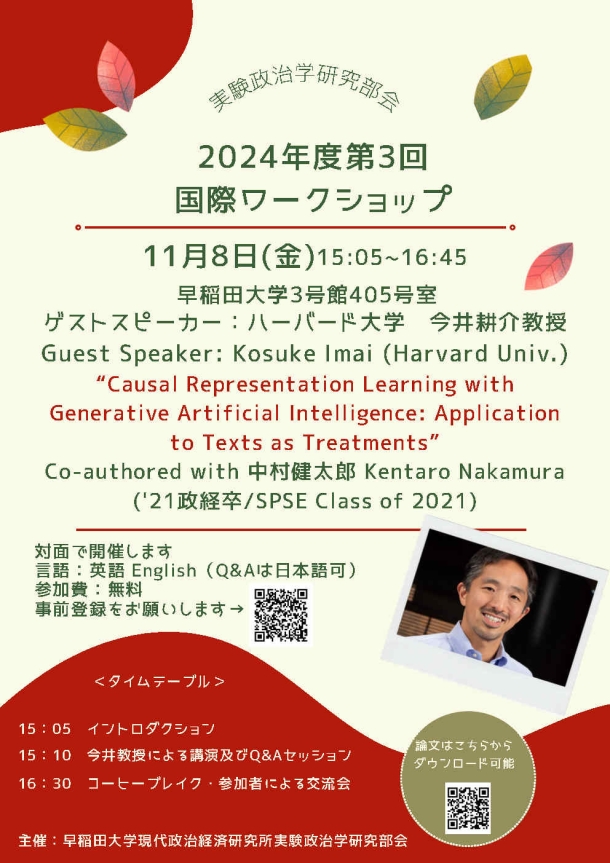- News
- 実験政治学研究部会2024年度第3回国際ワークショップ/Experimental Political Science Research Project FY2024 3rd International Workshop
実験政治学研究部会2024年度第3回国際ワークショップ/Experimental Political Science Research Project FY2024 3rd International Workshop

Dates
Add to calendar1108
FRI 2024- Place
- 3号館405号室 [Room 405 of Building 3(Waseda campus, Waseda Univ.)]
- Time
- 15:05‐16:45
- Posted
- 2024年10月29日(火)
# English follows Japanese
早稲田大学現代政治経済研究所実験政治学研究部会では、ハーバード大学政治学部・統計学部の今井耕介教授をお迎えして、以下の国際ワークショップを開催します。どうぞ奮ってご参加ください。
<日時と場所>
* 2024年11月8日(金)午後3時05分-午後4時45分
* 早稲田大学3号館405号室
* 対面開催のみ
* 使用言語:英語 ※Q&Aセッションは日本語可
15:05 イントロダクション
15:10 今井教授による講演及びQ&Aセッション
16:30 コーヒーブレイク・参加者による交流会
<事前登録>
以下のリンクから事前登録を行なってください。
https://forms.gle/SxRbZxM2QyCRyxzKA
<講演内容>
発表者:ハーバード大学政治学部・統計学部 今井耕介教授
タイトル:“Causal Representation Learning with Generative Artificial Intelligence: Application to Texts as Treatments”
In this paper, we demonstrate how to enhance the validity of causal inference with unstructured high-dimensional treatments like texts, by leveraging the power of generative Artificial Intelligence. Specifically, we propose to use a deep generative model such as large language models (LLMs) to efficiently generate treatments and use their internal representation for subsequent causal effect estimation. We show that the knowledge of this true internal representation helps separate the treatment features of interest, such as specific sentiments and certain topics, from other possibly unknown confounding features. Unlike the existing methods, our proposed approach eliminates the need to learn causal representation from the data and hence produces more accurate and efficient estimates. We formally establish the conditions required for the nonparametric identification of the average treatment effect, propose an estimation strategy that avoids the violation of the overlap assumption, and derive the asymptotic properties of the proposed estimator through the application of double machine learning. Finally, using an instrumental variables approach, we extend the proposed methodology to the settings, in which the treatment feature is based on human perception rather than is assumed to be fixed given the treatment object. We conduct simulation studies using the generated text data with an open-source LLM, Llama3, to illustrate the advantages of our estimator over the state-of-the-art causal representation learning algorithms.
論文はこちらからダウンロードすることができます。
https://imai.fas.harvard.edu/research/LLM.html
——-
The Waseda Institute of Political Economy’s Experimental Political Science Research Project will be holding the following international workshop with Professor Kosuke Imai from the Department of Statistics and Department of Government at Harvard University. We hope you will join us.
<Date and Time and Location>
* Friday, November 8, 2024, 3:05 p.m. – 4:45 p.m.
* Room 405, Building 3, Waseda University
* Face-to-face only
* Language: English * Q&A session in Japanese is also acceptable
15:05 Introduction
15:10 Lecture by Prof. Imai and Q&A session
16:30 Coffee break and social gathering for participants
<Pre-registration>
Please pre-register via the following link.
https://forms.gle/SxRbZxM2QyCRyxzKA
<Lecture content>
Presenter:Kosuke Imai, Professor in the Department of Government and the Department of Statistics at Harvard University
Title:“Causal Representation Learning with Generative Artificial Intelligence: Application to Texts as Treatments”
In this paper, we demonstrate how to enhance the validity of causal inference with unstructured high-dimensional treatments like texts, by leveraging the power of generative Artificial Intelligence. Specifically, we propose to use a deep generative model such as large language models (LLMs) to efficiently generate treatments and use their internal representation for subsequent causal effect estimation. We show that the knowledge of this true internal representation helps separate the treatment features of interest, such as specific sentiments and certain topics, from other possibly unknown confounding features. Unlike the existing methods, our proposed approach eliminates the need to learn causal representation from the data and hence produces more accurate and efficient estimates. We formally establish the conditions required for the nonparametric identification of the average treatment effect, propose an estimation strategy that avoids the violation of the overlap assumption, and derive the asymptotic properties of the proposed estimator through the application of double machine learning. Finally, using an instrumental variables approach, we extend the proposed methodology to the settings, in which the treatment feature is based on human perception rather than is assumed to be fixed given the treatment object. We conduct simulation studies using the generated text data with an open-source LLM, Llama3, to illustrate the advantages of our estimator over the state-of-the-art causal representation learning algorithms.
The paper can be downloaded here.
https://imai.fas.harvard.edu/research/LLM.html
Click here for flyer data.

